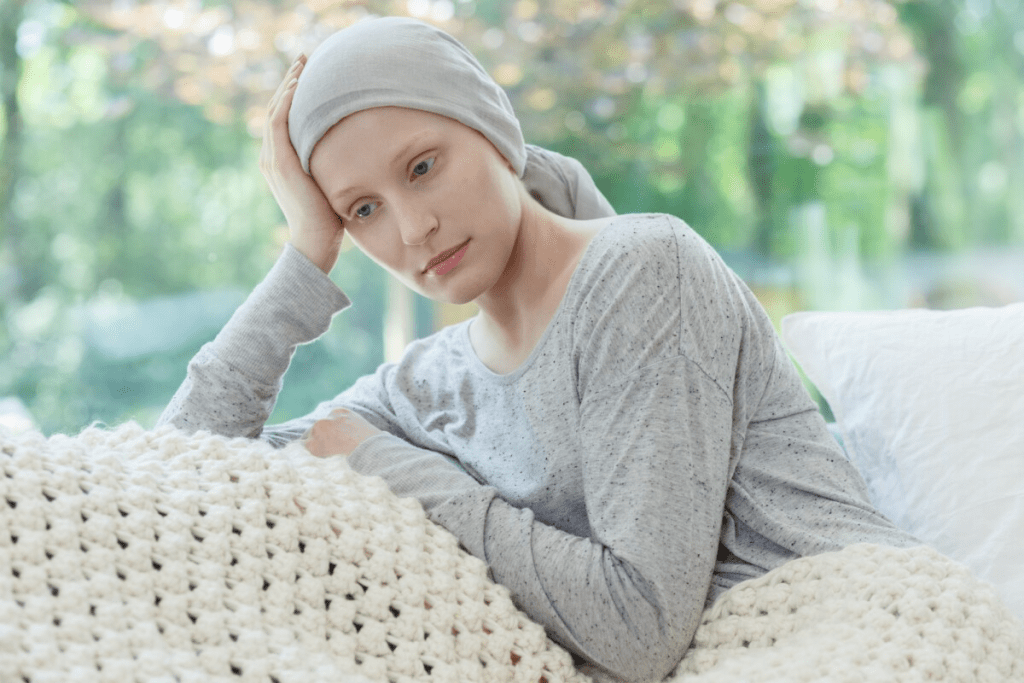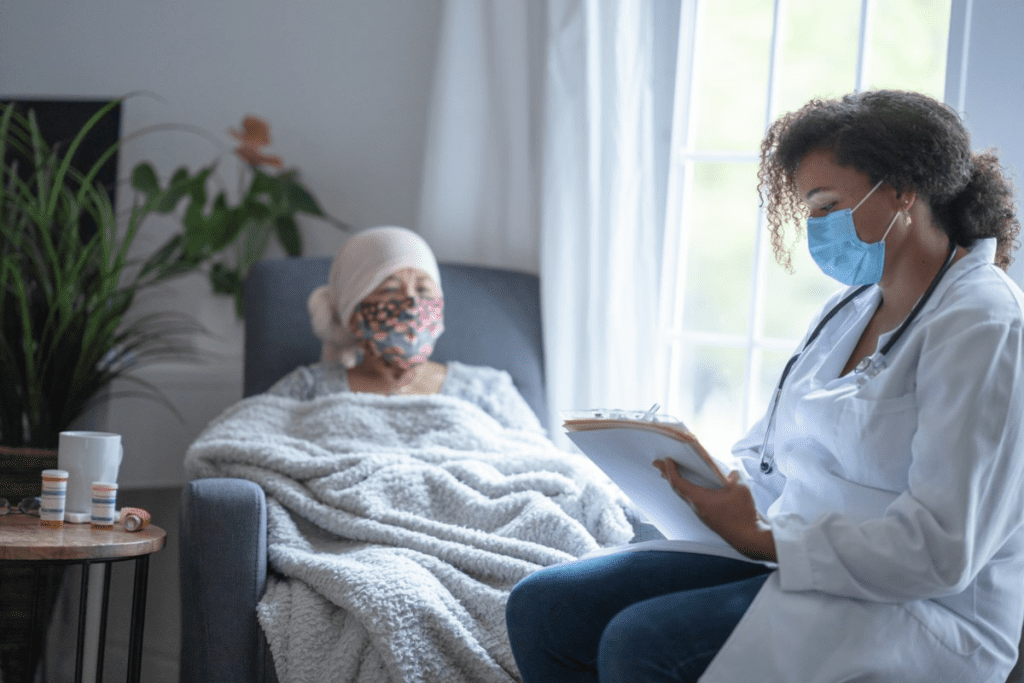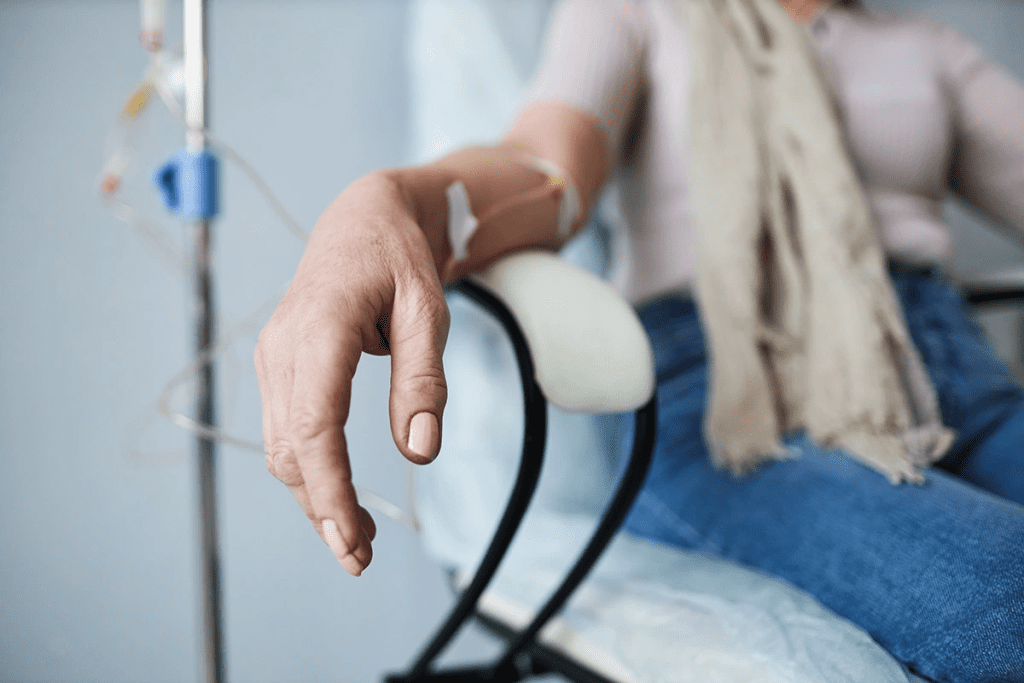Last Updated on November 13, 2025 by
Going through chemotherapy is tough, with the first days being the worst. You might feel sick, very tired, and your immune system might be weak.
At Liv Hospital, we know that 60-80% of patients face tough side effects right after chemotherapy. Our team helps manage these symptoms to make your experience better.

Knowing when symptoms get worse and how to recover helps. It prepares patients and families for better care and results. What are the hardest days after chemotherapy? Prepare for the terrible recovery timeline and get powerful, crucial tips for managing the worst side effects.
Knowing what happens after chemotherapy can help patients get ready for recovery. Chemotherapy targets fast-growing cells, like cancer cells, but also healthy ones. This leads to different chemotherapy side effects.
Chemotherapy can have a big impact on the body. It causes many side effects because it affects both cancer cells and healthy cells. About 60-80% of patients face strong side effects, like constant tiredness and mouth sores.

Common symptoms after chemotherapy include:
These side effects can vary in intensity and duration. They depend on individual factors and the type of chemotherapy.
Recovery from chemotherapy depends on many factors. These include overall health, age, and the specific chemotherapy regimen. Research shows the immune system can take months to recover. Some studies say certain immune cells may take up to nine months to get back to normal.
The right days after chemotherapy are tough, with the worst usually happening in the first 72 hours. This is when the body’s reaction to the treatment is at its strongest. It leads to a peak in symptoms.

Days 2-5 are often the toughest because the chemotherapy drugs build up in the body. This is when the side effects are at their worst. How bad it gets can vary a lot, depending on the treatment, your health, and any other health issues.
At Liv Hospital, we focus on understanding these factors to help manage side effects. Our support services aim to help patients get through this tough time.
During the peak, patients often feel very sick, tired, and experience other side effects. These symptoms can start within 24 to 48 hours and can last for weeks. Knowing what to expect can help patients prepare and seek help when needed.
Getting ready for the tough days after chemotherapy can make a big difference. At Liv Hospital, we offer support like nutrition advice, help with medications, and emotional support. This helps patients get through this hard time.
By knowing what to expect and having the right support, patients can deal better with chemotherapy side effects. This way, they can focus on getting better.
The first chemotherapy treatment is tough, with both physical and emotional challenges. At Liv Hospital, we know how important this first step is. We’re here to offer all the support you need.
The first chemotherapy session can be really scary. Patients feel a mix of emotions, from worry to uncertainty. A patient said, “It’s like stepping into the unknown, but with the right support, it becomes manageable.“
Getting ready for your first treatment is key. Our team at Liv Hospital helps you know what to expect. We talk about common side effects like nausea and fatigue. Knowing about chemotherapy side effects makes you feel more in charge.
Getting used to chemotherapy’s effects is important for a good treatment. We tell patients to eat well and drink plenty of water. This helps with side effects. A patient said, “
The support of the medical team and loved ones made all the difference during my treatment.
” Our team is here to help you through this tough time. We make sure you get the care you need to handle 1st chemo treatment side effects well.
The time right after chemotherapy can be tough. At Liv Hospital, we know how to help. We focus on easing these side effects to make recovery easier for our patients.
Severe fatigue is a big problem for many, hitting up to 70% of patients. It’s not just feeling tired. It’s a deep exhaustion that can make everyday tasks hard. Managing fatigue well is key. This might mean getting enough rest, eating right, and doing gentle exercises.
Nausea and stomach problems are common chemo side effects. These can be mild or very severe. We teach patients how to deal with these symptoms. This includes changing what they eat and using medicine.
Mouth sores and other oral issues can happen after chemo. Keeping the mouth clean and using special mouthwashes can help. Our team offers tips on handling these side effects.
Dealing with chemo side effects is a big part of getting better. We create care plans that fit each patient. This way, they can face these challenges and move forward with their recovery.
Patients getting chemotherapy might get “chemo belly.” This is when the belly gets big and they have digestive problems. We at our place know how tough this is. We want to help patients know why it happens and how to feel better.
“Chemo belly” makes the belly swell up. It’s because of changes in bowel habits, fluid buildup, and how chemo affects the stomach. Chemotherapy can also make the stomach upset, leading to nausea, vomiting, and changes in bowel habits. This makes people feel uncomfortable and bloated.
It’s key to manage digestive symptoms well. We suggest changing what you eat, drinking lots of water, and taking medicine for nausea and pain. Eating small meals often and avoiding foods that upset the stomach is a good idea.
Some digestive issues are normal after chemo. But, sometimes, you need to see a doctor. Look for severe belly pain, constant vomiting, or dehydration signs. Our team is here to help and support you.
Knowing why “chemo belly” happens and how to deal with it can make life better. It helps patients feel more comfortable during and after chemo.
After chemotherapy, patients often see their immune system weaken a lot. This is mainly because of neutropenia, a low white blood cell count. This makes them more likely to get infections. At Liv Hospital, we teach our patients about these risks and how to stay safe.
Neutropenia is a common side effect of chemotherapy. It affects many patients. When white blood cells are low, fighting infections becomes hard. We stress how important it is to know about this to stay safe.
The time when the immune system is weak varies. It starts soon after starting chemotherapy. We keep a close eye on our patients to catch any problems early. The biggest risk of getting sick is during neutropenia, usually 7-14 days after treatment.
To lower the chance of getting sick, we suggest a few steps. These include washing hands often, avoiding sick people, and staying out of crowded places. We also teach patients to spot early signs of infection and when to get help.
Recovery from chemotherapy is a long journey. It goes beyond the treatment itself. Understanding this journey is key for better care and support.
Studies show that it can take up to nine months for immune cells to recover. Some cells might only get back to 60-69% of their normal levels. At Liv Hospital, we keep up with new research to help our patients fully recover.
A major study found that immune cell recovery after chemotherapy takes a long time. It showed that some cells need up to nine months to get back to normal. This highlights the need for ongoing support and monitoring.
The study also looked at CD4 T cells and B cells, important for our immune system. It found that these cells recover to 60-69% of their normal levels in nine months. This knowledge helps us manage patient expectations and tailor their care.
Another important part of long-term recovery is dealing with nerve damage. Chemotherapy can cause nerve damage that lasts long after treatment. Knowing how to treat this damage is key to better patient outcomes.
By keeping up with the latest research, we can offer top-notch care. Our goal is to support each patient through their recovery journey. We’re dedicated to delivering world-class healthcare every step of the way.
Chemotherapy regimens vary a lot in what they contain and how they affect patients. The type of chemotherapy used can change the side effects patients face and how they recover. At our institution, we help patients understand their chemotherapy regimen. We then tailor our support services to meet their needs.
TC chemotherapy, made of Taxane and Carboplatin, is used for many cancers. It’s effective but has its own set of side effects. Common side effects include:
For advanced cancers, more intense chemotherapy is used. These regimens aim to fight the cancer harder. But, they can cause more severe side effects, like a higher risk of infection and more fatigue.
Combination therapy uses more than one chemotherapy agent. It can be more effective but also raises the risk of side effects. The effects depend on the agents used and how the patient responds.
It’s key to understand the details of chemotherapy regimens and their side effects for effective patient care. By tailoring support services to each patient’s needs, we can help lessen the challenges of chemotherapy.
At Liv Hospital, we know how tough the days can be after chemotherapy. Our team is here to help with practical tools. We aim to ease symptoms and support recovery with our care.
Eating right is key during chemotherapy. We suggest a diet full of proteins, vitamins, and minerals. Drinking lots of water is also important to flush out toxins and keep you healthy.
It’s important to find a balance between being active and resting. Staying active helps keep strength and mobility. But, rest when your body tells you to. Gentle exercises like yoga or short walks are good, but avoid hard activities.
Managing medications is vital to reduce chemotherapy side effects. Our team creates a plan tailored to your needs. This plan helps with symptoms like nausea, pain, and fatigue.
These strategies can help you get through the toughest days after chemotherapy. Our team at Liv Hospital is committed to supporting you. We offer care and guidance every step of the way.
A strong support network is key for those going through chemotherapy. It includes medical teams and caregivers. They help patients face the tough parts of treatment.
Knowing when to call your healthcare provider is important. If you have severe side effects like pain, fever, or trouble breathing, reach out.
Caregivers are essential during tough chemotherapy days. They help with daily tasks, manage meds, and offer emotional support.
Hospitals offer many resources to help with chemotherapy challenges. These include counseling, nutrition advice, and support groups.
An oncologist once said, “A strong support system is the backbone of cancer care. It’s not just about treating the disease; it’s about caring for the whole person.”
“The presence of a caregiver can significantly impact a patient’s recovery and overall well-being.”
With the help of medical teams, caregivers, and hospital resources, patients can handle chemotherapy better. This improves their quality of life.
Dealing with life after chemotherapy is tough, but with the right support, patients can get through it. At Liv Hospital, we’re here for our patients, giving them the care and tools to regain their strength.
When patients near the end of treatment, they often look back on their journey. They see how strong they’ve been and the people who supported them. Studies show that strong support during treatment leads to better results and a more positive experience.
Our goal at Liv Hospital is to provide top-notch healthcare. We aim to help patients not just get better, but also get back to their lives. We want to help our patients find their inner strength on their toughest days. And we promise to be with them every step of the way.
The hardest time is usually 48 to 72 hours after treatment. This is when side effects like severe nausea, fatigue, and other symptoms are at their peak.
Chemotherapy harms both cancer cells and healthy cells. This leads to side effects like nausea, fatigue, and a weakened immune system.
“Chemo belly” is when your stomach gets swollen after treatment. To manage it, you need to understand why it happens and how to handle digestive issues.
It can take months for your immune system to get back to normal. Some studies say it can take up to nine months for some immune cells to recover.
TC chemotherapy can cause severe fatigue, nausea, and problems with your mouth. These are managed with personalized care plans.
Caregivers offer emotional support and help with medication. They also assist with eating and drinking, which is key to recovery.
If you have severe side effects, signs of infection, or have concerns about your recovery, call your healthcare provider.
Long-term effects can include nerve damage and ongoing fatigue. These are managed with ongoing support and care.
To manage nausea and digestive issues, focus on nutrition and hydration. Also, manage your medications and know when to seek medical help.
Neutropenia is when you have a low white blood cell count, making you more prone to infections. It’s managed by taking protective measures during vulnerable times.
It’s important to find the right balance between activity and rest to manage fatigue and aid in recovery. Healthcare professionals can provide guidance.
Subscribe to our e-newsletter to stay informed about the latest innovations in the world of health and exclusive offers!